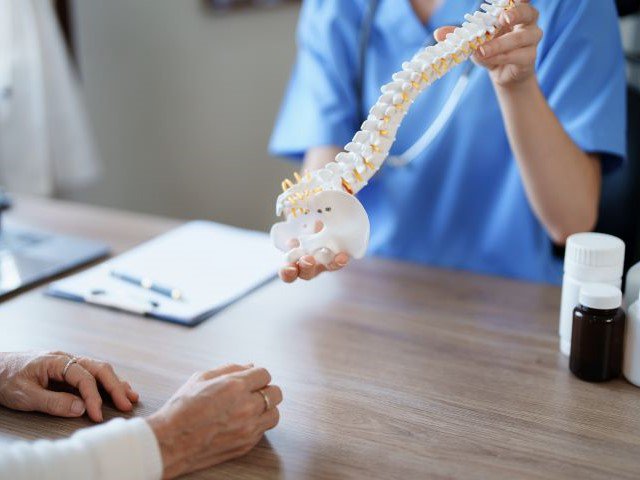
Prevent Osteoporosis
Resources for You

Building Bone Health: Tips to Help Prevent Osteoporosis
Osteoporosis
Bones provide our bodies with much-needed support, serving as footholds for our muscles, protecting our organs and delivering essential calcium. As you age, your bone metabolism slows, leading to bone loss or, in some cases, osteoporosis — a condition where bones become weak and brittle. Without proper care, this weakness can lead to fractures or breaks.
While some people are more at risk for developing osteoporosis due to their diet, genetics or ongoing health conditions, there are some steps you can take to help prevent this condition.
Causes of Osteoporosis
Did you know your skeleton completely regenerates itself every 10 years, removing old pieces of bone and replacing them with new, fresh tissue?
This process keeps your bones healthy and cells strong, facilitating the supply of calcium to your body, according to OrthoInfo. In young people, the ratio of bone removed and replaced is approximately equal, a process known as balanced bone remodeling. Conversely, this process often becomes unbalanced as adults age, resulting in structural bone and strength losses. This increases the body's susceptibility to bone diseases, including osteoporosis.
Aside from inherent factors like age, genetics, race and gender — women are much more likely to develop osteoporosis, as are people of white or Asian descent — there are also external pressures that can cause osteoporosis. It is also more likely to occur in people who:
- Struggle to get enough calcium for most of their life, leading to lower bone density, early bone loss and heightened fracture risk.
- Have a sedentary lifestyle, smoke tobacco or regularly drink more than two alcoholic drinks a day.
- Take medications that can interfere with the bone-regeneration process; this can include medications for seizures, cancer and certain types of hormonal birth control.
- Live with certain medical issues, such as Celiac, inflammatory bowel, kidney or liver disease. Rates are also higher for people with multiple myeloma and rheumatoid arthritis.
Ways to Help Reduce Your Risk
Some people have a higher risk of developing osteoporosis due to their genetics or medical history; however, there are ways you can help reduce your likelihood. These include:
- Eating a healthy diet – Have you ever heard of the concept of ‘food as medicine’? This idea emphasizes the therapeutic importance of healthy eating habits as a way to prevent, manage or even reverse certain health issues. When it comes to bone health, making sure you’re getting enough essential minerals and vitamins — such as calcium, phosphorous, potassium, zinc, magnesium and vitamins D, K and A — can help prevent bone loss. Getting enough protein in your diet is also essential in ensuring positive bone health.
- Staying active – Regular physical activity can increase muscle strength, improve balance, reduce pain and lower your risk of bone fractures. The Mayo Clinic recommends strength training, weight-bearing aerobic activities, flexibility exercises, stability and balance movements.
- Limiting smoking and alcohol consumption – Tobacco smoke and alcohol can negatively impact your health in a number of ways, including deep within your bones. Nicotine, including the kind in vape pens or smokeless tobacco, slows the production of osteoblasts, specialized cells your body relies on to build new bone tissue. It can also decrease your body’s absorption of calcium, resulting in fewer minerals for your bones. Furthermore, it’s also believed that excessive consumption of alcohol can prevent calcium and vitamin D absorption.
- Maintaining a healthy weight – Being underweight or overweight can negatively impact your bone health. Severely limiting food intake or being underweight can weaken bones, increasing the risk of fractures. While bearing extra weight can help strengthen your bones, it can also disrupt the delicate mineral and hormonal balance required to create new bone cells and break down old ones.
Osteoporosis can lead to weak and fragile bones, resulting in significant pain, disability and worsened quality of life. If you’re concerned about your likelihood of developing osteoporosis, contact your doctor as soon as possible to create a health plan that works for you. Do not change your diet or exercise routine without consulting them first, as some exercises may be harmful if you have weak bones. For more insights on ways to protect your health, look for our other informational articles at americanbusinesscoalition.info.
Articles in this newsletter are supposed to be informative, enlightening and helpful to you. While all information contained herein is meant to be completely factual, it is always subject to change. Articles are not intended to provide medical advice, diagnosis or treatment. Consult your doctor before starting any new wellness or exercise program.
Benefits may not be available at all membership levels. For more information, or to upgrade your membership, please call 833.418.0967
Return